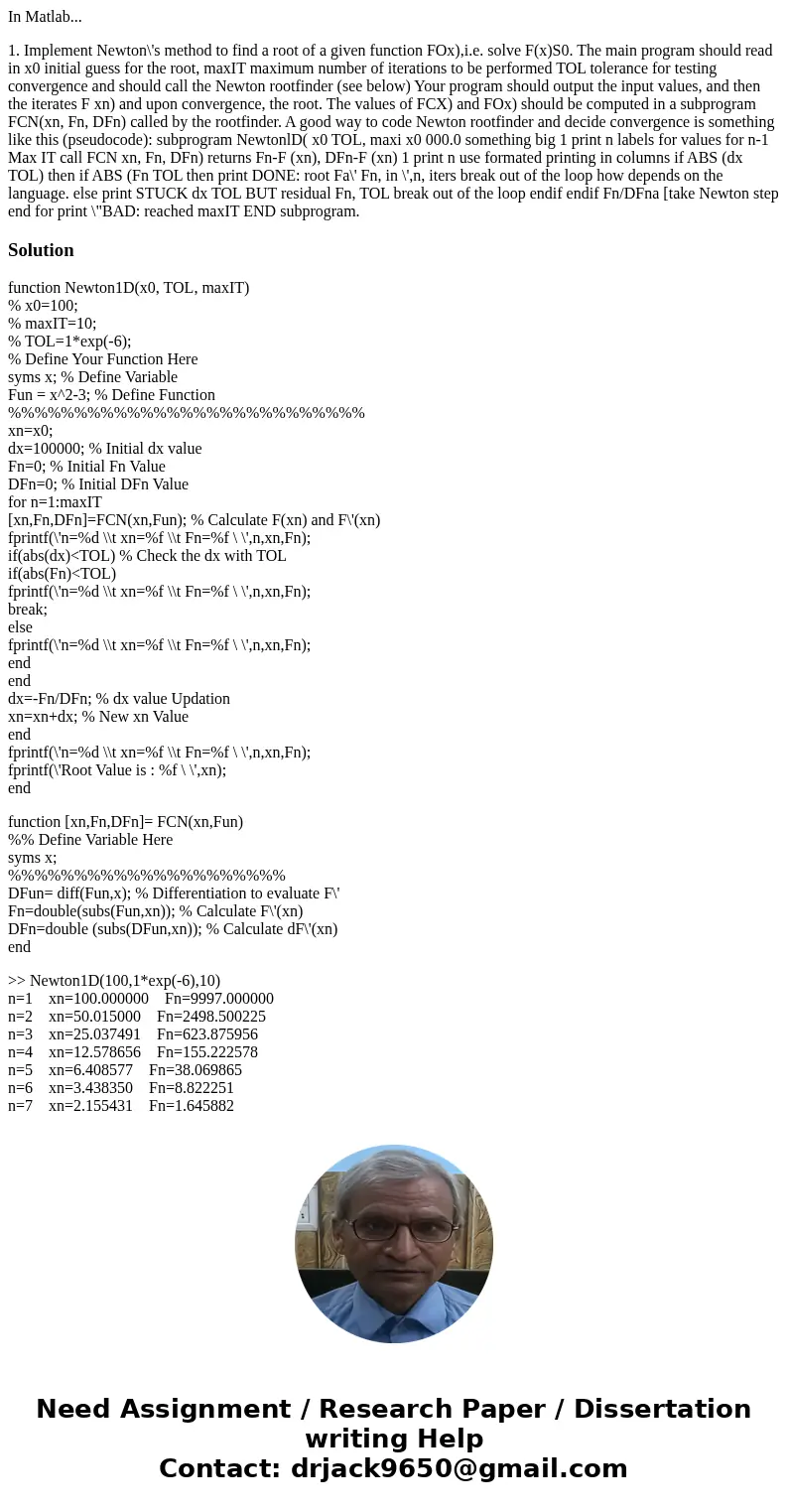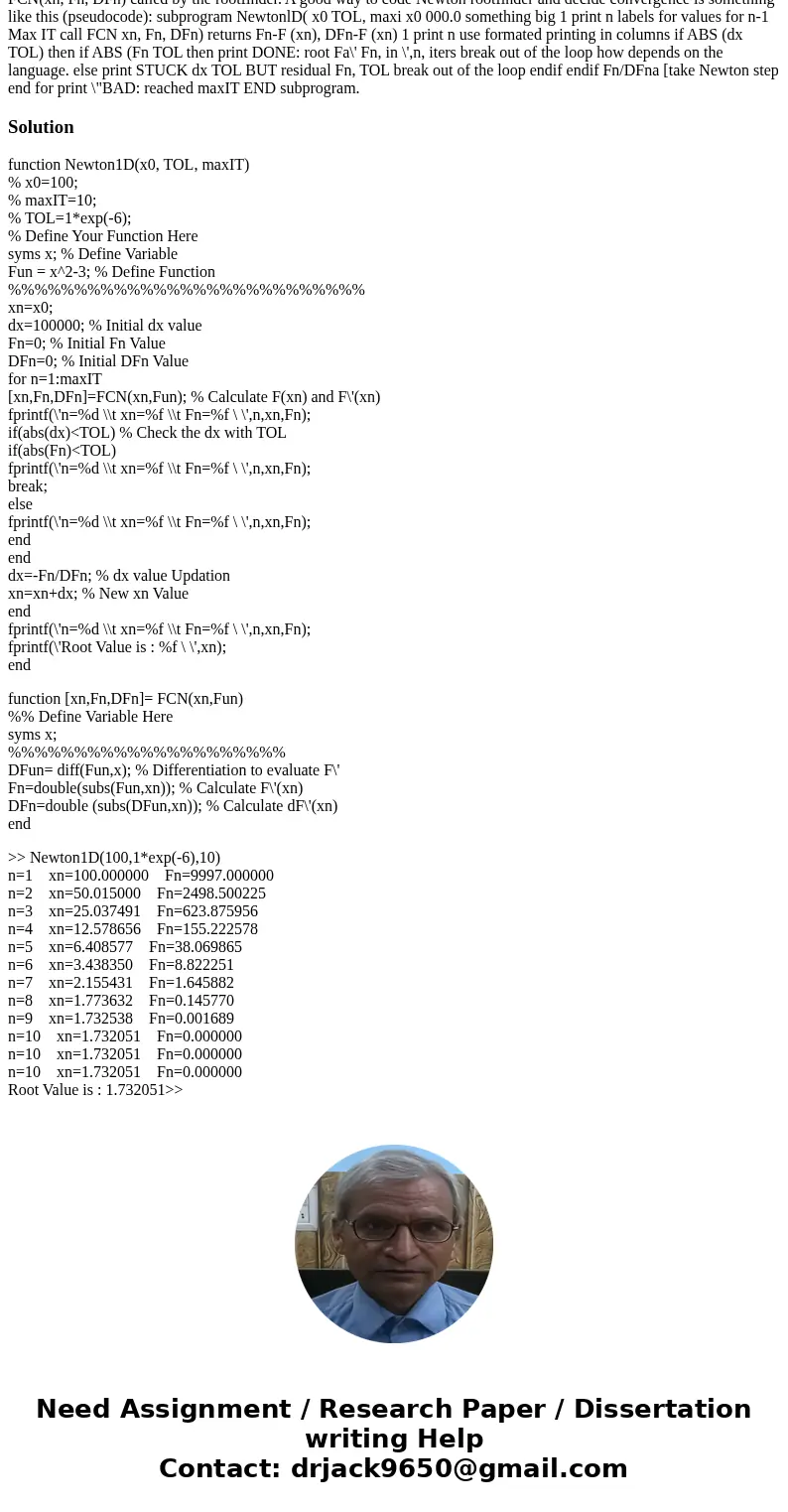In Matlab 1 Implement Newtons method to find a root of a giv
In Matlab...
1. Implement Newton\'s method to find a root of a given function FOx),i.e. solve F(x)S0. The main program should read in x0 initial guess for the root, maxIT maximum number of iterations to be performed TOL tolerance for testing convergence and should call the Newton rootfinder (see below) Your program should output the input values, and then the iterates F xn) and upon convergence, the root. The values of FCX) and FOx) should be computed in a subprogram FCN(xn, Fn, DFn) called by the rootfinder. A good way to code Newton rootfinder and decide convergence is something like this (pseudocode): subprogram NewtonlD( x0 TOL, maxi x0 000.0 something big 1 print n labels for values for n-1 Max IT call FCN xn, Fn, DFn) returns Fn-F (xn), DFn-F (xn) 1 print n use formated printing in columns if ABS (dx TOL) then if ABS (Fn TOL then print DONE: root Fa\' Fn, in \',n, iters break out of the loop how depends on the language. else print STUCK dx TOL BUT residual Fn, TOL break out of the loop endif endif Fn/DFna [take Newton step end for print \"BAD: reached maxIT END subprogram.Solution
function Newton1D(x0, TOL, maxIT)
% x0=100;
% maxIT=10;
% TOL=1*exp(-6);
% Define Your Function Here
syms x; % Define Variable
Fun = x^2-3; % Define Function
%%%%%%%%%%%%%%%%%%%%%%%%%%%
xn=x0;
dx=100000; % Initial dx value
Fn=0; % Initial Fn Value
DFn=0; % Initial DFn Value
for n=1:maxIT
[xn,Fn,DFn]=FCN(xn,Fun); % Calculate F(xn) and F\'(xn)
fprintf(\'n=%d \\t xn=%f \\t Fn=%f \ \',n,xn,Fn);
if(abs(dx)<TOL) % Check the dx with TOL
if(abs(Fn)<TOL)
fprintf(\'n=%d \\t xn=%f \\t Fn=%f \ \',n,xn,Fn);
break;
else
fprintf(\'n=%d \\t xn=%f \\t Fn=%f \ \',n,xn,Fn);
end
end
dx=-Fn/DFn; % dx value Updation
xn=xn+dx; % New xn Value
end
fprintf(\'n=%d \\t xn=%f \\t Fn=%f \ \',n,xn,Fn);
fprintf(\'Root Value is : %f \ \',xn);
end
function [xn,Fn,DFn]= FCN(xn,Fun)
%% Define Variable Here
syms x;
%%%%%%%%%%%%%%%%%%%%%
DFun= diff(Fun,x); % Differentiation to evaluate F\'
Fn=double(subs(Fun,xn)); % Calculate F\'(xn)
DFn=double (subs(DFun,xn)); % Calculate dF\'(xn)
end
>> Newton1D(100,1*exp(-6),10)
n=1 xn=100.000000 Fn=9997.000000
n=2 xn=50.015000 Fn=2498.500225
n=3 xn=25.037491 Fn=623.875956
n=4 xn=12.578656 Fn=155.222578
n=5 xn=6.408577 Fn=38.069865
n=6 xn=3.438350 Fn=8.822251
n=7 xn=2.155431 Fn=1.645882
n=8 xn=1.773632 Fn=0.145770
n=9 xn=1.732538 Fn=0.001689
n=10 xn=1.732051 Fn=0.000000
n=10 xn=1.732051 Fn=0.000000
n=10 xn=1.732051 Fn=0.000000
Root Value is : 1.732051>>


 Homework Sourse
Homework Sourse